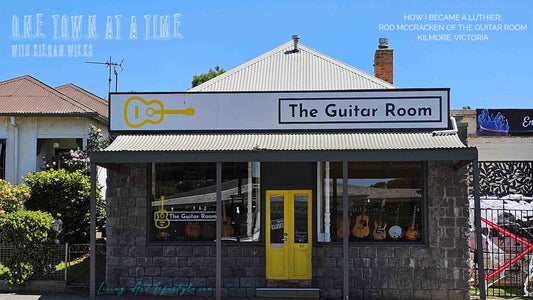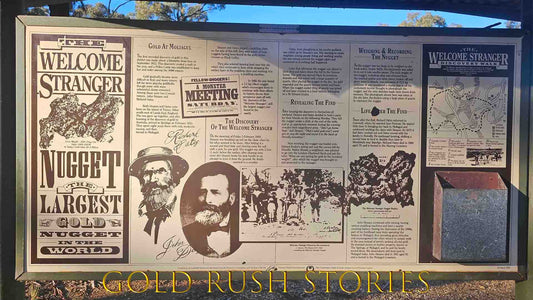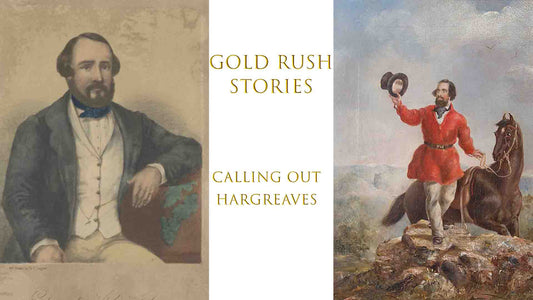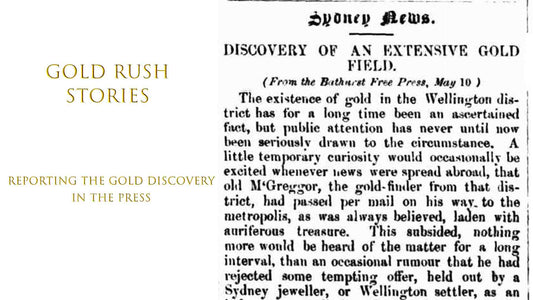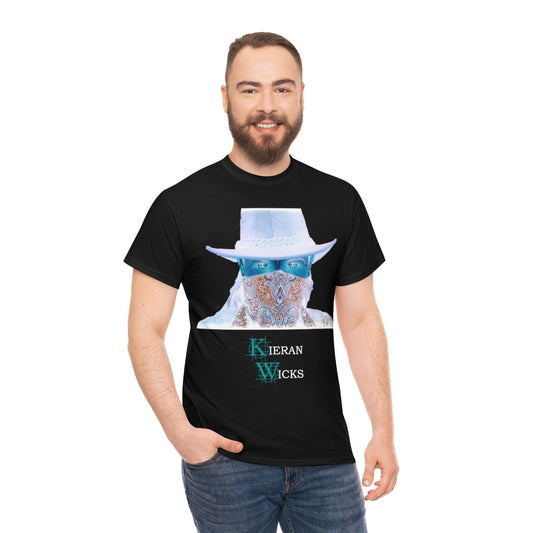

John Lewin, The Plains, Bathurst, watercolour drawing, ca. 1815, State Library of New South Wales
ROCK THE CRADLE – NURSURY OF A NATION ; NEW SOUTH WALES GOLD RUSH
The first flecks of gold were fished out of Fish creek in February 1823, 28 years later, on 14 May 1851, Hargreaves discovery was proclaimed, and within days the first Australian gold rush began with 100 diggers searching for their gold. By June there were over 2000 people digging around Bathurst, and thousands more were on their way.
Within 3 months of the gold pandemonium had well and truly gripped the nation.
As this article in the Bathurst Free Press on the 17th of May 1851. Entitled The Gold Fever, it offers an incredible insight into the social climate of the day, painting a vividly candid picture of the day as well offering many observations, forecasts and predictions for the present and future of the colony.
"Any attempt to describe the numberless scenes—grave, gay and ludicrous,— which have arisen out of this state of things, would require the graphic power of a Dickens, and would exceed any limit which could be assigned to it in a newspaper."
Bathurst c.1847-57 painted by Joseph Backler SLNSW
Microfleece Hoodie Tree of Life Collection
Perhaps foreshadowing what was the come for a colony experiencing growing pains and the imminent onset of social change.
“In fact there appears every probability of a complete social revolution in the course of time.”
The writer alluding to the fact that all who had gathered on the fields were gamblers. Taking a punt on discovering gold, cynically speculating that of those gathered “not more than three per cent will become permanent, miners”.
I feel a tinge of irony given that these observations were made a mere three months on from Hargreaves initial discovery. Little were they aware of the magnitude and the multitude that would follow from far and wide and beyond.
It’s like the writer didn’t understand what all the fuss was about and that it was surely short-sighted of to be overcome in the pandemonium. However correctly deducing where the “safe Bet” lie in the that of being a merchant trader or blacksmith.
Highlighting the inexperience of those hopeful souls, gold mining was more than just a combination of digging a hole and dumb luck.
It required real skills, determination and wear-with-all.
Those who sold wares and supplies to the miners were those destined to make fortunes!
"People of all trades, callings and pursuits, were quickly transformed into miners, and many a hand which had been trained to kid gloves, or accustomed to wield, nothing heavier than the grey goosequill became nervous to clutch the pick and crow-bar or "rock the cradle'' at our infant mines. The blacksmiths of the town could not turn off the picks fast enough, and the manufacture of cradles was the second briskest business of the place."
There was nothing out there and they were going out there with virtually nothing.
The odds of perishing in the elements were very real!
Demand for basic staples such as flour were inflated so much at the time as to command near famine prices.
it is to be hoped that there are capitalists now to adventure in one of the safest speculations of the times—the purchase of flour for the supply of' the district.
Tree of Life Collection Inner Desire Collection Flame Trees Collection






THE GOLD FEVER. (1851, May 17). Bathurst Free Press
The discovery of the fact by Mr. Hargraves that the country from the mountain ranges to an indefinite extent into the interior is one immense gold field, has produced a tremendous excitement in the town of Bathurst and the surrounding districts. For several days after our last publication, the business of the town was utterly paralysed. A complete mental madness appears to have seized almost every member of the community, and as a natural consequence there has been an universal rush to the diggins. Any attempt to describe the numberless scenes—grave, gay and ludicrous,— which have arisen out of this state of things, would require the graphic power of a Dickens, and would exceed any limit which could be assigned to it in a newspaper.
Groups of people were to be seen early on Monday morning at every corner of the streets, assembled in solemn conclave, debating both possibilities and impossibilities, and eager to pounce upon any human being who was likely to give any information about, the diggins. People of all trades, callings and pursuits, were quickly transformed into miners, and many a hand which had been trained to kid gloves, or accustomed to wield, nothing heavier than the grey goose-quill became nervous to clutch the pick and crow-bar or "rock the cradle'' at our infant mines. The blacksmiths of the town could not turn off the picks fast enough, and the manufacture of cradles was the second briskest business of the place.
A few left town on Monday equipped for the diggins, but on Tuesday, Wednesday and Thursday the roads to Summer Hill Creek became literally alive with new made miners from every quarter, some armed with picks, others shouldering crow bars, or shovels and not a few strung round with wash-hand basins, tin-pots and cullinders. Garden and agricultural implements of every variety either hung from the saddle bow or dangled about the persons of the pilgrims to Ophir. Now and then a respectable tradesman who had just left his bench or counter would heave into sight with a huge something in front of his horse which he called a cradle, and with which he was about to rock himself into fortune. Scores have rushed from their homes provided with a blanket, a "damper" and a pick or grubbing hoe, full of hope that a day or two's labour would fill their pockets with the precious metal, and we have heard of a great number who have started without any provision but a blanket and some rude implement to dig with. Such is the intensity of the excitement that people appear almost regardless of their present comfort, and think of nothing but gold.
Of course all this must end in disappointment. The wet weather of the last two nights, with the damp ground for a bed, and the teeming clouds for a canopy, will do much towards damping the enthusiasm of numbers. We have the authority of an experienced man in stating that from the imperfect and unsuitable implements used by nearly all who have left tor the diggins, coupled with their miserable provision in other respects, success is impossible—that the labour necessary
to success is extremely severe, and he ventures as his opinion that not more than three per cent will become permanent, miners. One of the consequences has been a rapid rise in the price of provisions. Flour which ranged from 26s. to 28s. per 100lbs. has been sold for 45s.; tea, sugar, and almost every other eatable commodity have advanced in equal proportion. A large amount of the wheat of the district is in the hands of a few speculators, who will maintain their hold in the hope of a golden harvest. But for the very extensive supplies now on the way from Sydney, flour would soon be at a famine price, and should a rush take place from below, as may be reasonably expected, it is to be hoped that there are capitalists now to adventure in one of the safest speculations of the times —the purchase of flour for the supply of' the district.
What assisted very materially to fan the excitement into a flame was the arrival of a son of Mr. Neal, the brewer with a piece of pure metal weighing 11 ounces, which was purchased by Mr. Austin for £30 who started to Sydney by the following day's mail with the gold and the news. Since that an old man arrived in town with several pieces in mass, weighing in all from 2 to 3lbs. He also started for Sydney with his prize Mr. Kennedy, the Manager of the Bathurst branch of the Union Bank of Australia visited the digging on Saturday last in company with Messrs. Hawkins and Green. Each, of these gentlemen picked up a small piece of the pure metal, and a few handfuls of the loose earth from the bed of the creek, which were brought home by Mr Kennedy, from motives of curiosity have since been assayed by Mr. Corfe from Sydney, and a piece of gold extracted therefrom, of the size of a small pea. Besides these we have not heard of any particular instances of success.
On Wednesday morning last, Mr. Hargraves accompanied Mr. Stutchbury, the Government Geologist to the diggins, and with his own hands washed a pan of earth in his presence, from which twenty one grains of fine gold were produced. He afterwards washed several buckets of earth and produced gold therefrom. Mr. Stutchbury hereupon expressed his satisfaction, and immediately furnished him with credentials, which have since been forwarded to government. The fact of the existence of gold is therefore clearly established, and whatever credit or emolument may arise therefrom, Mr. Hargraves is certainly the individual to whom it properly belongs. Should government deem it necessary, as it most probably, will, to appoint an inspector, superintendent, or commissioner over the gold regions, in addition to the fact of Mr. Hargraves being the discoverer, his practical acquaintance with mining points him out as the most suitable and worthy person for the appointment. We have very much more to say but have not space to say it in. A Mr. Rudder, an experienced California gold-digger is now at work at the diggins. There are also several magistrates plying their picks and cradles most laboriously, but we have not heard with what success. In fact there appears every probability of a complete social revolution in the course of time. Those who are not already departed are making preparations.
Servants of every description are leaving their various employments and the employers are per necessitate preparing to follow. But notwithstanding all this we feel confident that a reaction will speedily take place. The approach of winter and wet weather will do something towards cooling the ardour of the excited multitude.
THE BATHURST FREE PRESS. SATURDAY, MAY 10, 1851. (1851, May 17). Bathurst Free Press (NSW : 1849 - 1851), p. 4. Retrieved July 6, 2021, from http://nla.gov.au/nla.news-article62215986
THE GURU COLLECTION HOODIE

DIGGERS ON THE ROAD TO A RUSH - BOOTH 1873
THE ILL-PREPARED
Edward Hargreaves himself wrote to the futility of many ill-prepared following in his wake, unknowingly, if not ignorantly, destined for the unforeseen failure facing them ahead on the goldfields.


EDWARD HAMMOND HARGRAVES.
Sydney, May 30.
To the Editors of the Sydney Morning Herald,
GENTLEMEN,—Having passed on my road from Bathurst from 800 to 1000 people who are off to the diggings, to say nothing of the inability of a great portion of these people to endure the necessary labour to obtain gold, not ten per cent. of the whole have any tools to work with, or a single pound to support themselves during their journey to the mines. Gold digging is very hard work; the season of the year is against carrying on operations in mining; a few hours' rain would put an entire stop to digging, as the creek rises many feet in a single hour; consequently those parties who go there without the means of supporting themselves until the waters subside, will most bitterly repent the steps they are so unadvisedly taking.
I regret exceedingly to hear many poor people have left their employment for the purpose of seeking their fortune in the precarious occupation of gold digging. I venture to predict a very small percentage will do good, and a very great amount of human misery must be the result of this reckless digging mania. I admit most unusual success has been the result of the pioneer miners, but there is no guarantee of its continuance. Indeed I very much question it; therefore, I beg of you to warn those who have employment in the more useful occupations of life, not to leave it, as they will be better off than the gold seekers in the end—independent of the immense risk, exposure, and privation, the latter are subject to.
I may take this opportunity of saying, with reference to remarks said to have emanated from the Rev. W. B. Clarke, as to prior claims to the discovery of gold, that I never had the slightest idea of any such discovery, if it ever took place ; and that I know nothing of any articles on the subject. On this point I may on a future occasion solicit some space in your columns.
You will exercise your influence as public journalists to check the present excitement which will, I trust, be the means of preventing much suffering amongst the people. Provisions are very high at the diggings, and I see no chance of the unfortunate people getting employment, and do verily believe the people of the County of Bathurst and Wellington, will, in less than thirty days refuse men for their rations only. Time will prove the correctness of the statements of
Yours, obediently,
EDWARD HAMMOND HARGRAVES.
Steamer Comet, May 27.
To the Editors of the Sydney Morning Herald. (1851, May 28). The Sydney Morning Herald (NSW : 1842 - 1954), p. 2. Retrieved July 20, 2021, from http://nla.gov.au/nla.news-article12927449
THE MONOLITH - SANDLEWOOD WATCH
SOCIATAL SYMPTOMS OF GOLD FEVER
Australia was very much trying to establish its own identity at the onset of the rush. Akin to a pre-pubescent teen, much of the country was still unknown and unexplored from the white man’s perspective.
Prior to the revelation of gold (and mineral resources in general), the value the land offered to the new settlers was held in the rich pastoral fields, and as a holding pen for the unwanted rabble of British society.
The responsibilities of establishing an economy foisted upon them, the colonial administrators saw the ability to raise, crops, cattle and sheep / wool for export as the priority.
After all Australia was ‘built on the sheep’s back’ - The Golden fleece

The Golden Fleece Exhibit - Waltzing Matilda Centre Winton Outback Queensland
This situation was summed up in an article printed on the same day and same page as the GOLD Fever article
Entitled “The Discovery and its Consequences” it describes the colonies new found predicament of an abundance of resource with an intangible value, questioning the balance of the cultural impacts both positive and negative.
“Real value it is to be feared will be the sacrificed for representative value, bread and beef for gold, and the temperate and sober pleasures of domestic life for the dreamy and intoxicating but illusive expectations of a golden future. The mania appears to have seized all classes and conditions of society.”
To many it was a simple calculation of simple return on investment.
If you can’t feed your work force, how can you expect them to labour in the gold fields?
It was feared that convicts and free settlers would leave their assigned work locations to rush to the new find to seek their fortunes, in particular damaging the emerging pastoral industry.
They simply couldn’t spare the man power, nor feed the fresh hordes of people congregating on the gold fields.
“The thousands who will rush to our shores, will require feeding, or in other words they must eat beef, mutton and flour. Is it not clear therefore that all the grain which can be grown will be wanted to supply the pressing necessities of a rapidly increasing population, and that as a vastly increased demand for our sheep and oxen must take place coincidently with this increase, that their production will prove as lucrative as mining?”
Pastoral industries could not only feed the population, but also provided goods for export and trade. Whereas, gold is more of a currency than commodity, and international trade occurred by sailing ship, so the short-term solution was more obvious to some than others.
Supplies of food and hardware were in short supply and this raised the price to unrealistic levels. Workers able to operate businesses in the non-direct mining industry became in very short supply as an example the major service town of Bathurst was practically abandoned of able-bodied men for general commerce during the Ophir rush.
“The gold-digger would then learn from those stern tutors — hunger and starvation, that his accumulated treasure was of little avail — that gold-dust could neither be eaten nor drank, and that he had sown the wind and reaped the whirl-wind.
One conclusion may be reasonably arrived at, that whatever good or evil may spring out of the discovery, will with few exceptions be shared in by the whole community. This portion of our subject appears to us to be of paramount importance, and we feel that our duty would only be half performed if we did not draw attention to the terrible consequences which must ensue if the farmers of the surrounding districts neglect their crops. The present is the season for ploughing and sowing, and it is perhaps singularly unfortunate that the discovery has been made at this point of time. With the deficiency of the past harvest added to the neglect of agriculture which it may occasion, and the certain influx of population from other lands, nothing short of a destructive and devastating famine would be the result.”
THE RINGER II - AREA RUG 5' ROUND

Summer Hill Creek, Ophir Goldmine as it appeared in 1851 - SLNSW








THE DISCOVERY AND ITS CONSEQUENCES.
THE BATHURST FREE PRESS.
SATURDAY, MAY 17 1851.
"MAGNA EST VERITAS ET PRÆVALEBIT"
THE DISCOVERY AND ITS CONSEQUENCES.
WHATEVER may be the ultimation of the recent auriferous discoveries alluded to in our last, one thing is absolutely certain, they will be productive of much immediate social confusion and disorder, if not of pecuniary loss and destruction of property. Real value it is to be feared will be the sacrificed for representative value, bread and beef for gold, and the temperate and sober pleasures of domestic life for the dreamy and intoxicating but illusive expectations of a golden future. The mania appears to have seized all classes and conditions of society.
Men otherwise remarkable for prudence, shrewdness and sagacity in their worldly transactions have become victims to a feverish and reckless excitement. The ordinary pursuits of daily life are either neglected or treated with contempt. The moderate profits of a steady or a thriving business or the proceeds of remunerative employment sink into insignificance when compared with the glittering possibilities which may accrue from the pick and cradle of the gold-digger. Scores are rushing to the diggins who are neither fitted by habit nor physical strength to encounter the difficulties and privations, the exposure and toil which are incidental to such a mode of life, and though men of this class may sooner or later discover that nature and education never intended them for miners, their desertion of their work benches, counting-houses and plough-tails will most certainly work a serious evil to themselves and in some degree to the community at large. In dealing with our present subject we are encountering a very difficult task, and enter upon it with a lively sense of its extreme responsibility. As public journalists, we are bound to take cognizance of passing events and represent them as truthfully as our means of information will permit. We also claim the privilege which appertains to our position of expressing an opinion upon the consequences to which those events may lead. That an immense gold field has been discovered in this region it would be worse than useless to deny, and any attempt to hoodwink or mislead the public would be not only futile but contemptible. Rather be it our task to offer a few suggestions, which have occurred to us after a most dispassionate consideration of the subject, aided by all the facts and means of intelligence which the best opportunities have offered us. As we have before stated, people are rushing by scores and hundreds from their ordinary avocations to the diggins, evidently possessed with the idea that a pick, a shovel and a peck of flour, are a complete miner's equipment. Very many of these adventurers in quest of the new El Dorado, appear not to understand that gold-digging is a very slavish and laborious occupation, for the successful prosecution of which they are in no respect calculated. They do not appear to be aware that if gold really exists to any considerable extent, that the value of all articles of consumption will rise somewhat in proportion to the amount produced, and that therefore as blacksmiths, bakers and brewers or as tillers of the soil, they will ultimately discover that to bake, brew and grow wheat or to shape the molten iron will eventually become as remunerative or even perhaps more so, than raking the bowels of the earth for auriferous treasure.
Should the gold mines present and to come prove as productive as is anticipated, there remains not a shadow of doubt that this colony will become inundated with adventurers from every portion of Great Britain and other European nations and a favorite field for the employment of capital. The thousands who will rush to our shores, will require feeding, or in other words they must eat beef, mutton and flour. Is it not clear therefore that all the grain which can be grown will be wanted to supply the pressing necessities of a rapidly increasing population, and that as a vastly increased demand for our sheep and oxen must take place coincidently with this increase, that their production will prove as lucrative as mining?
The true California therefore to the husbandman is the soil he cultivates. Let him remain at his ploughtail, and cover in as many acres as his circumstances will allow, and he will discover that whilst he has been occupied in a manner, consistent with his habits and feelings, and has been enjoying under the agreeable shelter of a roof, the ordinary comforts of domestic life, that by the time he has disposed of his coming crop, he will be as rich, if not a richer man than his neighbour, who preferred the certain toil and hardship of a miner's life, and the exposure to the inclemencies of the weather, which its nomadic character entails. The remarks now made in reference to the cultivation of the soil will apply with almost equal force to any other occupation.
One conclusion may be reasonably arrived at, that whatever good or evil may spring out of the discovery, will with few exceptions be shared in by the whole community. This portion of our subject appears to us to be of paramount importance, and we feel that our duty would only be half performed if we did not draw attention to the terrible consequences which must ensue if the farmers of the surrounding districts neglect their crops. The present is the season for ploughing and sowing, and it is perhaps singularly unfortunate that the discovery has been made at this point of time. With the deficiency of the past harvest added to the neglect of agriculture which it may occasion, and the certain influx of population from other lands, nothing short of a destructive and devastating famine would be the result. The misery, destitution and death most certainly consequent upon such a concurrence of events, would be equally shared by all classes. The gold-digger would then learn from those stern tutors — hunger and starvation, that his accumulated treasure was of little avail — that gold-dust could neither be eaten nor drank, and that he had sown the wind and reaped the whirl-wind. Let us therefore impress upon our agricultural readers the necessity of attending to their cultivation. Let them recollect the dying bequest of the husbandman to his sons, and that their treasure lays hidden somewhere about a foot beneath the surface of the soil. We implore them as they love their wives and children and are desirous to promote their own comfort and worldly advancement, to listen to this advice and tender it to others. We have appealed to their self-interest and to the best feelings of their hearts, let us now remind them of their solemn duty as rational and sentient beings springing from one common father — the God of all. Let them seriously ponder within their own minds upon the dreadful amount and variety of crime and vice which invariably follows in the wake of a famine, and for which as a community an awful responsibility would rest upon them. That hunger knows no law is a saying as old as the language in which it is written, and if it were needful to cite instances, we need only point to the harrowing details of the recent famine in Ireland and the partially disclosed descriptions of human suffering at the mines of California — disclosed only partially because of the existence of an interested press, and our position will be fully established.
We are guilty of no libel in saying that the whole district is drunk with excitement, unless we recognise the legal axiom— "the greater the truth the greater the libel." The people are delirious with golden fever. May it be hoped that it will only prove a "temporary insanity," and that during its continuance an irremediable injury may not be inflicted upon the whole body politic, by neglecting its substantial duties and interests. We would again impress upon many of our readers who may not be aware of it, that gold is not real, it is only representative wealth, that it is only valued by the necessaries, comforts, and luxuries which it will purchase, that its abundance must lessen its value, and that if the hills and valleys of Australia were one glittering mass of auriferous deposit, New South Wales would become a miserable, poverty-stricken country, without the wheat, beef, and mutton which it contains. Witness Spain after its conquest of Mexico and Peru.
Prudence and foresight are of equal importance to societies and nations as to individuals, and if ever the exercise of these qualities was incumbent upon the people of this district— we may say of the whole colony, it is most especially so now. Upon their exercise or neglect depends whether the discovery will prove a blessing or a curse. If we do our duty to ourselves, and do not suffer our common sense to be drowned by excitement, we believe that it may be the means of rendering this a great and prosperous country. That it may do so every honest and fervent heart will humbly but devoutly pray. Before concluding, and after looking the dangers and difficulties fairly in the face, we may be permitted to say that we do not despair. Of the hundreds who have already started to the mines, few most probably will remain there permanently. Complete ignorance of the process of digging and washing, inadequate and unsuitable implements, hunger and exposure to the weather, will, in numerous instances, produce disappointment and disgust, and the unsuccessful diggers will be glad to return to their comfortable homes and ordinary occupations. Numbers are already returning with frustrated hopes and ardour cooled down, some of whom, now for the first time, are made acquainted with the real meaning of " home, sweet home." The madness and recklessnes of impulse once subsided by contact with stern but unexpected reality, reason will resume her sway, and many will be made convincingly aware of their unfitness for gold digging. The settlement of an efficient and successful body of miners will be a work of time. If we can only pass through the ordeal which inevitably awaits us, we doubt not but much ultimate good will ensue. In the meantime we would recommend the adoption of the motto — '' Hope on, hope ever!'
http://nla.gov.au/nla.news-article62215986
THE BATHURST FREE PRESS. SATURDAY, MAY 10, 1851. (1851, May 17). Bathurst Free Press (NSW : 1849 - 1851), p. 4. Retrieved July 6, 2021, from http://nla.gov.au/nla.news-article62215986
Ophir, site of first discovery of Gold – 1930
But ultimately opening up the gold fields was essentially an opportunity / instrument by which the colonial administrators could grow the population through encouraging immigration. An opportunity was presented for independence rather than co- dependence. Equal parts currency / commodity.

PAYABLE GOLD
A SHORT STORY BY HENRY LAWSON
Among the crowds who left the Victorian side for New South Wales about the time Gulgong broke out was an old Ballarat digger named Peter McKenzie. He had married and retired from the mining some years previously and had made a home for himself and family at the village of St. Kilda, near Melbourne; but, as was often the case with old diggers, the gold fever never left him, and when the fields of New South Wales began to blaze he mortgaged his little property in order to raise funds for another campaign, leaving sufficient behind him to keep his wife and family in comfort for a year or so.
As he often remarked, his position was now very different from what it had been in the old days when he first arrived from Scotland, in the height of the excitement following on the great discovery. He was a young man then with only himself to look out for, but now that he was getting old and had a family to provide for he had staked too much on this venture to lose. His position did certainly look like a forlorn hope, but he never seemed to think so.
Peter must have been very lonely and low-spirited at times. A young or unmarried man can form new ties, and even make new sweethearts if necessary, but Peter’s heart was with his wife and little ones at home, and they were mortgaged, as it were, to Dame Fortune. Peter had to lift this mortgage off.
Nevertheless he was always cheerful, even at the worst of times, and his straight grey beard and scrubby brown hair encircled a smile which appeared to be a fixture. He had to make an effort in order to look grave, such as some men do when they want to force a smile.
It was rumoured that Peter had made a vow never to return home until he could take sufficient wealth to make his all-important family comfortable, or, at least, to raise the mortgage from the property, for the sacrifice of which to his mad gold fever he never forgave himself. But this was one of the few things which Peter kept to himself.
The fact that he had a wife and children at St. Kilda was well known to all the diggers. They had to know it, and if they did not know the age, complexion, history and peculiarities of every child and of the “old woman” it was not Peter’s fault.
He would cross over to our place and talk to the mother for hours about his wife and children. And nothing pleased him better than to discover peculiarities in us children wherein we resembled his own. It pleased us also for mercenary reasons. “It’s just the same with my old woman,” or “It’s just the same with my youngsters,” Peter would exclaim boisterously, for he looked upon any little similarity between the two families as a remarkable coincidence. He liked us all, and was always very kind to us, often standing between our backs and the rod that spoils the child — that is, I mean, if it isn’t used. I was very short-tempered, but this failing was more than condoned by the fact that Peter’s “eldest” was given that way also. Mother’s second son was very good-natured; so was Peter’s third. Her “third” had a great aversion for any duty that threatened to increase his muscles; so had Peter’s “second”. Our baby was very fat and heavy and was given to sucking her own thumb vigorously, and, according to the latest bulletins from home, it was just the same with Peter’s “last”.
I think we knew more about Peter’s family than we did about our own. Although we had never seen them, we were as familiar with their features as the photographer’s art could make us, and always knew their domestic history up to the date of the last mail.
We became interested in the McKenzie family. Instead of getting bored by them as some people were, we were always as much pleased when Peter got a letter from home as he was himself, and if a mail were missed, which seldom happened — we almost shared his disappointment and anxiety. Should one of the youngsters be ill, we would be quite uneasy, on Peter’s account, until the arrival of a later bulletin removed his anxiety, and ours.
It must have been the glorious power of a big true heart that gained for Peter the goodwill and sympathy of all who knew him.
Peter’s smile had a peculiar fascination for us children. We would stand by his pointing forge when he’d be sharpening picks in the early morning, and watch his face for five minutes at a time, wondering sometimes whether he was always smiling inside, or whether the smile went on externally irrespective of any variation in Peter’s condition of mind.
I think it was the latter case, for often when he had received bad news from home we have heard his voice quaver with anxiety, while the old smile played on his round, brown features just the same.
Little Nelse (one of those queer old-man children who seem to come into the world by mistake, and who seldom stay long) used to say that Peter “cried inside.”
Once, on Gulgong, when he attended the funeral of an old Ballarat mate, a stranger who had been watching his face curiously remarked that McKenzie seemed as pleased as though the dead digger had bequeathed him a fortune. But the stranger had soon reason to alter his opinion, for when another old mate began in a tremulous voice to repeat the words “Ashes to ashes, an’ dust to dust,” two big tears suddenly burst from Peter’s eyes, and hurried down to get entrapped in his beard.
Peter’s goldmining ventures were not successful. He sank three duffers in succession on Gulgong, and the fourth shaft, after paying expenses, left a little over a hundred to each party, and Peter had to send the bulk of his share home. He lived in a tent (or in a hut when he could get one) after the manner of diggers, and he “did for himself,” even to washing his own clothes. He never drank nor “played,” and he took little enjoyment of any kind, yet there was not a digger on the field who would dream of calling old Peter McKenzie “a mean man”. He lived, as we know from our own observations, in a most frugal manner. He always tried to hide this, and took care to have plenty of good things for us when he invited us to his hut; but children’s eyes are sharp. Some said that Peter half-starved himself, but I don’t think his family ever knew, unless he told them so afterwards.
Ah, well! the years go over. Peter was now three years from home, and he and Fortune were enemies still. Letters came by the mail, full of little home troubles and prayers for Peter’s return, and letters went back by the mail, always hopeful, always cheerful. Peter never gave up. When everything else failed he would work by the day (a sad thing for a digger), and he was even known to do a job of fencing until such time as he could get a few pounds and a small party together to sink another shaft.
Talk about the heroic struggles of early explorers in a hostile country; but for dogged determination and courage in the face of poverty, illness, and distance, commend me to the old-time digger — the truest soldier Hope ever had!
In the fourth year of his struggle Peter met with a terrible disappointment. His party put down a shaft called the Forlorn Hope near Happy Valley, and after a few weeks’ fruitless driving his mates jibbed on it. Peter had his own opinion about the ground — an old digger’s opinion, and he used every argument in his power to induce his mates to put a few days’ more work in the claim. In vain he pointed out that the quality of the wash and the dip of the bottom exactly resembled that of the “Brown Snake”, a rich Victorian claim. In vain he argued that in the case of the abovementioned claim, not a colour could be got until the payable gold was actually reached. Home Rule and The Canadian and that cluster of fields were going ahead, and his party were eager to shift. They remained obstinate, and at last, half-convinced against his opinion, Peter left with them to sink the “Iawatha,” in Log Paddock, which turned out a rank duffer — not even paying its own expenses.
A party of Italians entered the old claim and, after driving it a few feet further, made their fortune.
* * * *
We all noticed the change in Peter McKenzie when he came to “Log Paddock,” whither we had shifted before him. The old smile still flickered, but he had learned to “look” grave for an hour at a time without much effort. He was never quite the same after the affair of Forlorn Hope, and I often think how he must have “cried” sometimes “inside.”
However, he still read us letters from home, and came and smoked in the evening by our kitchen-fire. He showed us some new portraits of his family which he had received by a late mail, but something gave me the impression that the portraits made him uneasy. He had them in his possession for nearly a week before showing them to us, and to the best of our knowledge he never showed them to anybody else. Perhaps they reminded him of the flight of time — perhaps he would have preferred his children to remain just as he left them until he returned.
But stay! there was one portrait that seemed to give Peter infinite pleasure. It was the picture of a chubby infant of about three years or more. It was a fine-looking child taken in a sitting position on a cushion, and arrayed in a very short shirt. On its fat, soft, white face, which was only a few inches above the ten very podgy toes, was a smile something like Peter’s. Peter was never tired of looking at and showing the picture of his child — the child he had never seen. Perhaps he cherished a wild dream of making his fortune and returning home before that child grew up.
* * * *
McKenzie and party were sinking a shaft at the upper end of Log Paddock, generally called “The other end”. We were at the lower end.
One day Peter came down from “the other end” and told us that his party expected to “bottom” during the following week, and if they got no encouragement from the wash they intended to go prospecting at the “Happy Thought,” near Specimen Flat.
The shaft in Log Paddock was christened “Nil Desperandum.” Towards the end of the week we heard that the wash in the “Nil” was showing good colours.
Later came the news that “McKenzie and party” had bottomed on payable gold, and the red flag floated over the shaft. Long before the first load of dirt reached the puddling machine on the creek, the news was all round the diggings. The “Nil Desperandum” was a “Golden Hole!”
* * * *
We will not forget the day when Peter went home. He hurried down in the morning to have an hour or so with us before Cobb and Co. went by. He told us all about his little cottage by the bay at St. Kilda. He had never spoken of it before, probably because of the mortgage. He told us how it faced the bay — how many rooms it had, how much flower garden, and how on a clear day he could see from the window all the ships that came up to the Yarra, and how with a good telescope he could even distinguish the faces of the passengers on the big ocean liners.
And then, when the mother’s back was turned, he hustled us children round the corner, and surreptitiously slipped a sovereign into each of our dirty hands, making great pantomimic show for silence, for the mother was very independent.
And when we saw the last of Peter’s face setting like a good-humoured sun on the top of Cobb and Co.’s, a great feeling of discontent and loneliness came over all our hearts. Little Nelse, who had been Peter’s favourite, went round behind the pig-stye, where none might disturb him, and sat down on the projecting end of a trough to “have a cry,” in his usual methodical manner. But old “Alligator Desolation,” the dog, had suspicions of what was up, and, hearing the sobs, went round to offer whatever consolation appertained to a damp and dirty nose and a pair of ludicrously doleful yellow eyes.
(LAWSON, 1900)
New South Wales gold prospecting, ca. 1850-ca. 1860, attributed to an officer of the 11th Regiment of Foot.
A watercolour and pencil drawing depicting a gold mining scene in New South Wales. A digger in the foreground is panning for gold in a creek while beside him another man is operating a cradle. Tents and more prospectors can be seen on a hill in the background. The watercolour shows the two methods of alluvial gold mining, panning and cradling, that were used by prospectors during the early gold rushes in New South Wales.
Possibly depicting Ophir, the scene of Australia’s first gold discovery in 1851. The gold diggings were located at the confluence of Summer Hill Creek and Lewis Ponds Creek.Artist is unknown but attributed to an officer of the 11th Foot as stated in the inscription.
It is also believed this is an early view of Ophir, N.S.W., ca. 1851-ca. 1852, possibly Summer Hill Creek and attributed to the work of George French Angas on stylistic grounds and also that Angas travelled to Ophir in 1851.The 1st/11th Regiment (North Devonshire) was garrisoned in the colony from 1845 to 1857. The first division of the regiment containing headquarters and three companies, had sailed from Chatham aboard the Castle Eden in July 1845. The remainder of the regiment followed in the Ramilies in August 1845. After service in Sydney they were transferred to Hobart Town, but returned in 1846 to restore discipline to the riotous and unruly 99th Regiment. The 11th was a popular regiment returning again to garrison Sydney in response to a public petition in 1848. The 11th occupied Victoria Barracks until they sailed for England in 1857.
REFERENCES
- LAWSON, H. (1900). ON THE TRACK. Retrieved From PROJECT GUTENBERG: www.Gutenberg.Org/Files/1231/1231-H/1231-H.Htm#Link2h_4_0019
- THE BATHURST FREE PRESS. SATURDAY, MAY 10, 1851. (1851, May 17). Bathurst Free Press (NSW : 1849 - 1851), p. 4. Retrieved July 6, 2021, from http://nla.gov.au/nla.news-article62215986
- THE BATHURST FREE PRESS. SATURDAY, MAY 10, 1851. (1851, May 17). Bathurst Free Press (NSW : 1849 - 1851), p. 4. Retrieved July 6, 2021, from http://nla.gov.au/nla.news-article62215986
- To the Editors of the Sydney Morning Herald. (1851, May 28). The Sydney Morning Herald (NSW : 1842 - 1954), p. 2. Retrieved July 20, 2021, from http://nla.gov.au/nla.news-article12927449
IMAGE REFERENCES
- John Lewin, The Plains, Bathurst, watercolour drawing, ca. 1815, State Library of New South Wales - attributed to John Lewin (1770 - 1819), Public domain, via Wikimedia Commons - https://commons.wikimedia.org/wiki/File:The_Plains,_Bathurst.jpg
- Bathurst c.1847-57 painted by Joseph Backler SLNSW - https://collection.sl.nsw.gov.au/record/nmQdbvRn/2BNaKJlA8VdbB
- Charles Bayliss, Aust. - “B.O. Holtermann’s Photographs, Copyright Registered.” - https://www.joseflebovicgallery.com/pages/books/CL172-24/charles-bayliss-aust/bathurst
- DIGGERS ON THE ROAD TO A RUSH - BOOTH 1873 - Image extracted from page 053 of volume 1 of Australia … Illustrated with drawings by Skinner Prout, N. Chevalier, by BOOTH, Edwin Carton. Original held and digitised by the British Library - https://commons.wikimedia.org/wiki/File:BOOTH(1873)_1.053_DIGGERS_ON_THE_ROAD_TO_A_RUSH.jpg
- Summer Hill Creek, Ophir Goldmine as it appeared in 1851 – SLNSW - https://collection.sl.nsw.gov.au/record/1kVEPqxn/d73l6rRLbpaOR
- Ophir, site of first discovery of gold – 1930 (2 photos) https://collection.sl.nsw.gov.au/record/nZNow6Qn/8Oz7ogXWWGEJR https://collection.sl.nsw.gov.au/record/92eJELPY/vZbO23MK82xZM
- On the Track (short story collection).jpg 1923 edition (for On the Track (short story collection)) - https://en.wikipedia.org/wiki/File:On_the_Track_(short_story_collection).jpg
- New South Wales gold prospecting, ca. 1850-ca. 1860, attributed to an officer of the 11th Regiment of Foot - https://collection.sl.nsw.gov.au/record/n5lXzWE9/NWrv4LxmzMyv2

LUMINOUS COLLECTION

GOLDEN EYE COLLECTION YOGA LEGGINGS
Subscribe to our newsletter now to keep updated on our adventures!

Do you want to spoil that special someone?
Do you need a unique gift idea for birthdays or Christmas?
Presents for him or Presents for her?
Our Gift Idea Collections will solve all of your problems.
Gifts for Him and Gifts for Her, Living Art Lifestyle is the ideal gift idea resource.
There’s so much to choose from you’re assured to find the perfect present for her and a guaranteed great gift for him!
Rest assured, you’re not alone, the perfect gift can be hard to find, and that’s what we are here for, devoted to providing you with the ideal gift experience.

An interior decorator’s delight, enhance and bring warmth to any room with our unique home décor solutions.
Winter fashion and summer fashion are taken care of with our exclusive ranges of inspired, versatile all seasons designer fashion.
Along with our selection of exquisite jewelry, whether it be a pendant necklace, ring or bracelet our artisan designed, Bohemian Chic collections are assured to complete any ensemble.
A magic carpet ride, our artisan designs transport you to another world.
Learn the stories behind the designs HERE on our blog.
Bring the adventure home and decorate your everyday with real-life fairy-tale scenes, illuminating the essence of Mother Nature’s esoteric magic and wonder…
If you’re looking for unique travel ideas, things to do or places to visit, Living Art Lifestyle is the ultimate trip planner essential for your next holiday vacation as you discover Australia, One Town at a Time. Tourist attractions, and secret destinations sure to make your next road trip one to remember.
Explore Australia and learn the stories behind our designs, One Town at a Time, our part travel vlog, part tour diary, part history lesson, part wildlife documentary, with moments of delight, debauchery, self-discovery and determination.


GOLDEN EYE COLLECTION YOGA LEGGINGS
Subscribe to our newsletter now to keep updated on our adventures!

Do you want to spoil that special someone?
Do you need a unique gift idea for birthdays or Christmas?
Presents for him or Presents for her?
Our Gift Idea Collections will solve all of your problems.
Gifts for Him and Gifts for Her, Living Art Lifestyle is the ideal gift idea resource.
There’s so much to choose from you’re assured to find the perfect present for her and a guaranteed great gift for him!
Rest assured, you’re not alone, the perfect gift can be hard to find, and that’s what we are here for, devoted to providing you with the ideal gift experience.

An interior decorator’s delight, enhance and bring warmth to any room with our unique home décor solutions.
Winter fashion and summer fashion are taken care of with our exclusive ranges of inspired, versatile all seasons designer fashion.
Along with our selection of exquisite jewelry, whether it be a pendant necklace, ring or bracelet our artisan designed, Bohemian Chic collections are assured to complete any ensemble.
A magic carpet ride, our artisan designs transport you to another world.
Learn the stories behind the designs HERE on our blog.
Bring the adventure home and decorate your everyday with real-life fairy-tale scenes, illuminating the essence of Mother Nature’s esoteric magic and wonder…
If you’re looking for unique travel ideas, things to do or places to visit, Living Art Lifestyle is the ultimate trip planner essential for your next holiday vacation as you discover Australia, One Town at a Time. Tourist attractions, and secret destinations sure to make your next road trip one to remember.
Explore Australia and learn the stories behind our designs, One Town at a Time, our part travel vlog, part tour diary, part history lesson, part wildlife documentary, with moments of delight, debauchery, self-discovery and determination.
